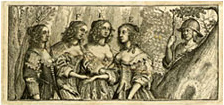Aylett Sammes, Britannia Antiqua Illustrata (1676)
Full Text
Not available
EEBO/TCP
Not available
Date
1676
Author
Aylett Sammes Note: 13/10/2005
Book title
Britannia Antiqua Illustrata: Or, The Antiquities Of Ancient Britain, Derived from the Phoenicians: Wherein the Original Trade of this Island is discovered, the Names of Places, Offices, Dignities, as likewise the Idolatry, Language, and Customs of the Primitive Inhabitants are clearly demonstrated from that Nation, many old Monuments illustrated, and the Commerce with that People, as well as the Greeks, plainly set forth and collected out of approved Greek and Latin Authors. Together With a Chronological History of this Kingdom, from the first Traditional Beginning, until the year of our Lord 800, when the Name of Britain was changed into England; Faithfully collected out of the best Authors, and disposed in a better Method than hitherto hath been done; with the Antiquities of the Saxons, as well as Phoenicians, Greeks, and Romans
Publication place
London
Printer
Thomas Roycroft
Publisher
Author
Text type
printed book
Genre
Proper and place name indexes
Subject area
- antiquities
- place name
Summary
Sizable essays on place names.
Word-group
type: alphabetical
Word-entry
type: headword
sample: ASIA, by the Greeks is said to have taken its name from Asia the Mother of Promethem. Asia, called so from its Scituation, lying between Africk and Europe, and its Position is so described by Pliny, Mela, and Eustathius. Asi, in the Phoenician Language signifieth the Country, Between, or in the Middle. (p. 19)
sample: ASIA, by the Greeks is said to have taken its name from Asia the Mother of Promethem. Asia, called so from its Scituation, lying between Africk and Europe, and its Position is so described by Pliny, Mela, and Eustathius. Asi, in the Phoenician Language signifieth the Country, Between, or in the Middle. (p. 19)
Alston
XIV.4
Wing
S 535




